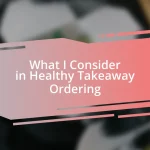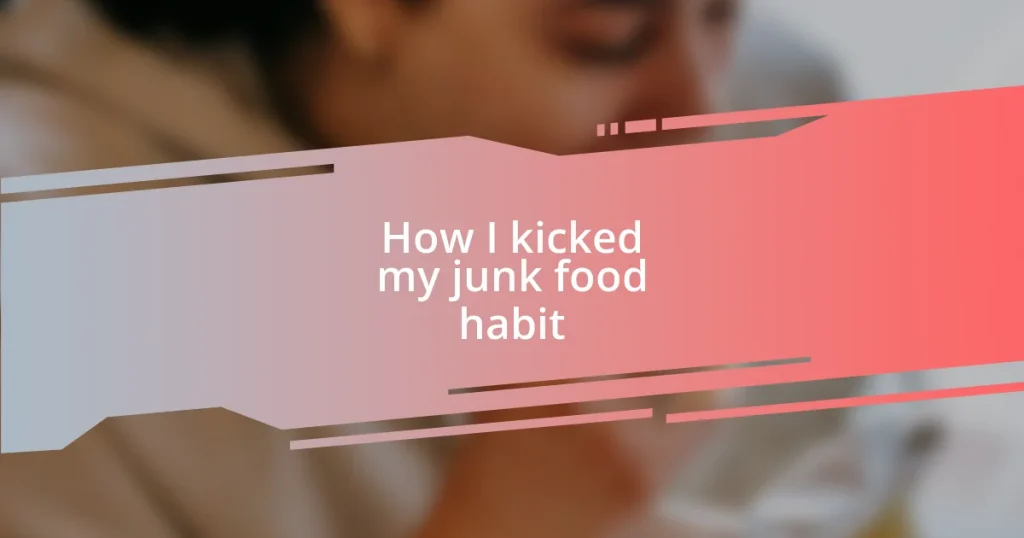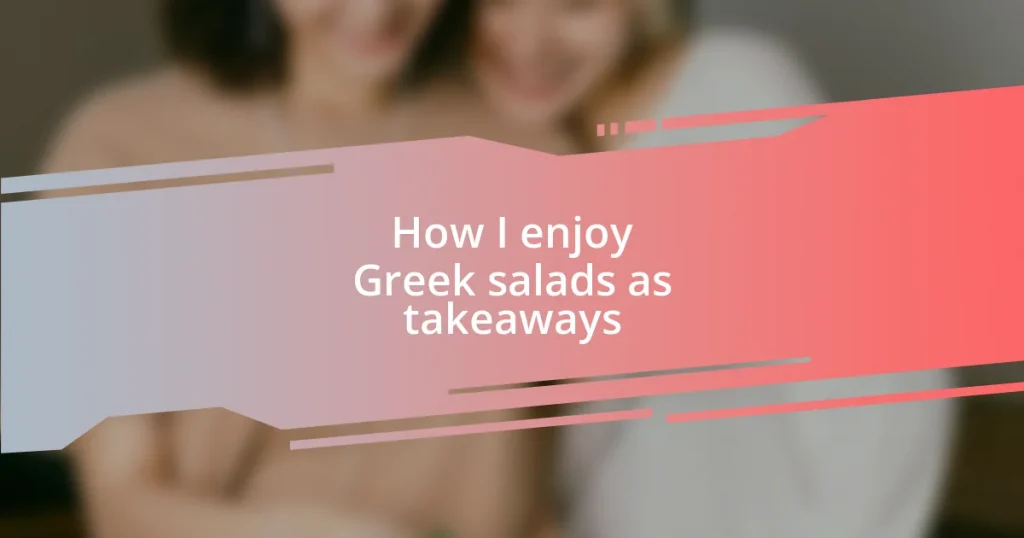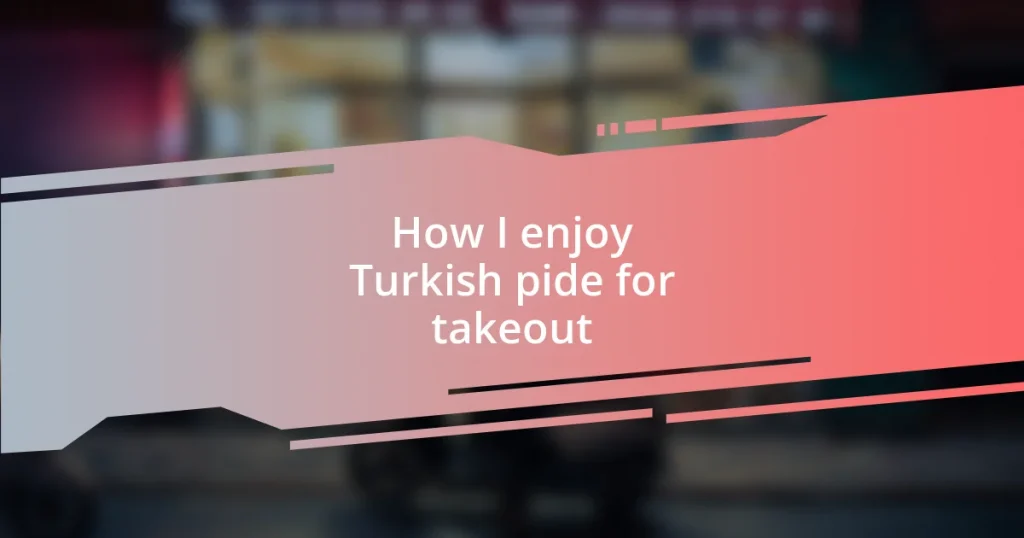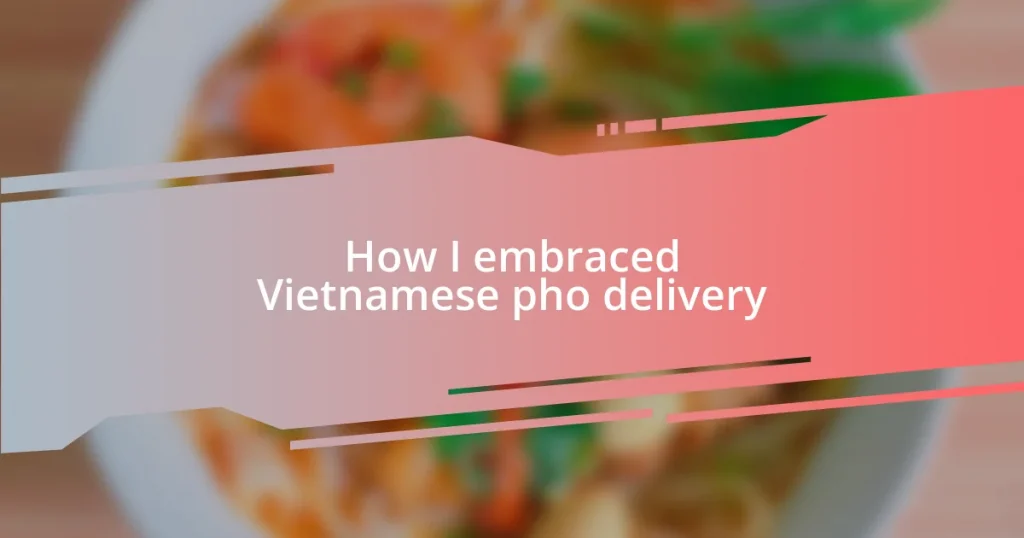Key takeaways:
- Recognized emotional triggers and environmental influences that led to unhealthy snacking habits.
- Implemented healthier food substitutes and focused on mindful eating to replace junk food consumption.
- Established a supportive environment and practiced self-compassion to maintain long-term healthy habits.
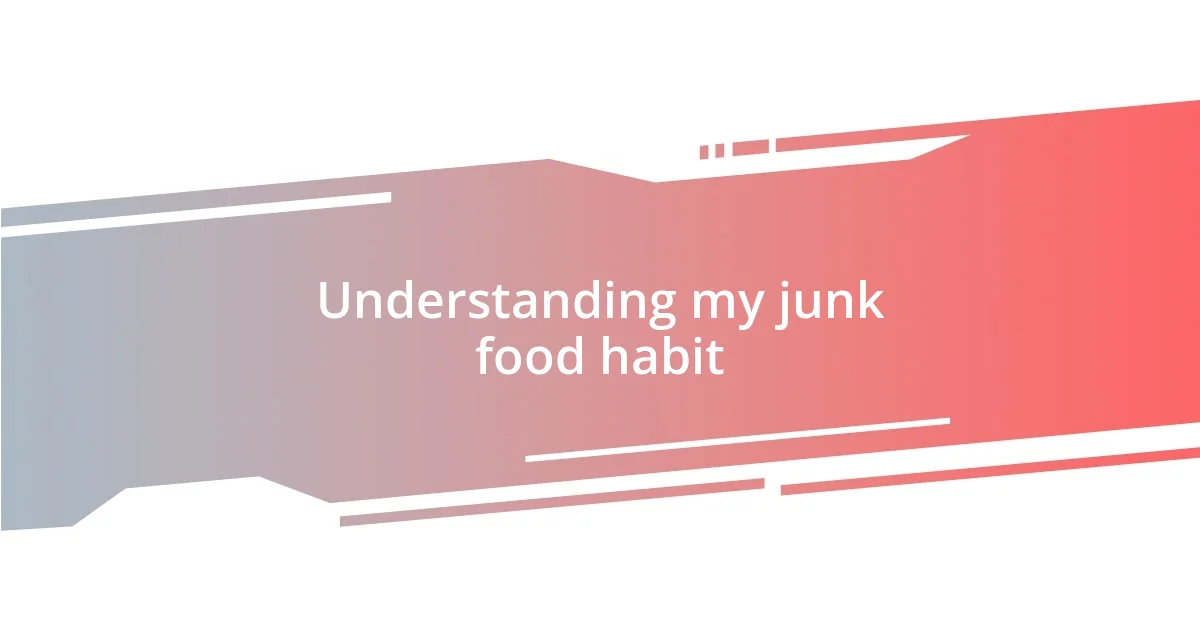
Understanding my junk food habit
I remember those late nights when I would indulge in chips or candy as a way to unwind after a long day. It made me wonder: was I really hungry, or was I just using food to fill an emotional void? Over time, I realized that my junk food habit was not just about cravings; it was a way of coping with stress and fatigue.
Connecting the dots, I began to notice patterns in my snack choices. Were those sugary treats really satisfying me, or was that temporary bliss quickly replaced by guilt and regret? Each time I reached for that bag of cookies, I felt a fleeting happiness, but soon after, I was left feeling bloated and lethargic. Reflecting on it, I understood that my relationship with junk food was deeply intertwined with my emotional state.
It’s fascinating how certain environments heightened my cravings. For instance, gatherings often led me to mindlessly munch on appetizers, almost as if I were compelled to join in. I thought, why was it so hard to say no when everyone around me was indulging? This understanding was a turning point; acknowledging the influence of my surroundings made me more aware of my choices and motivated me to change my habits.
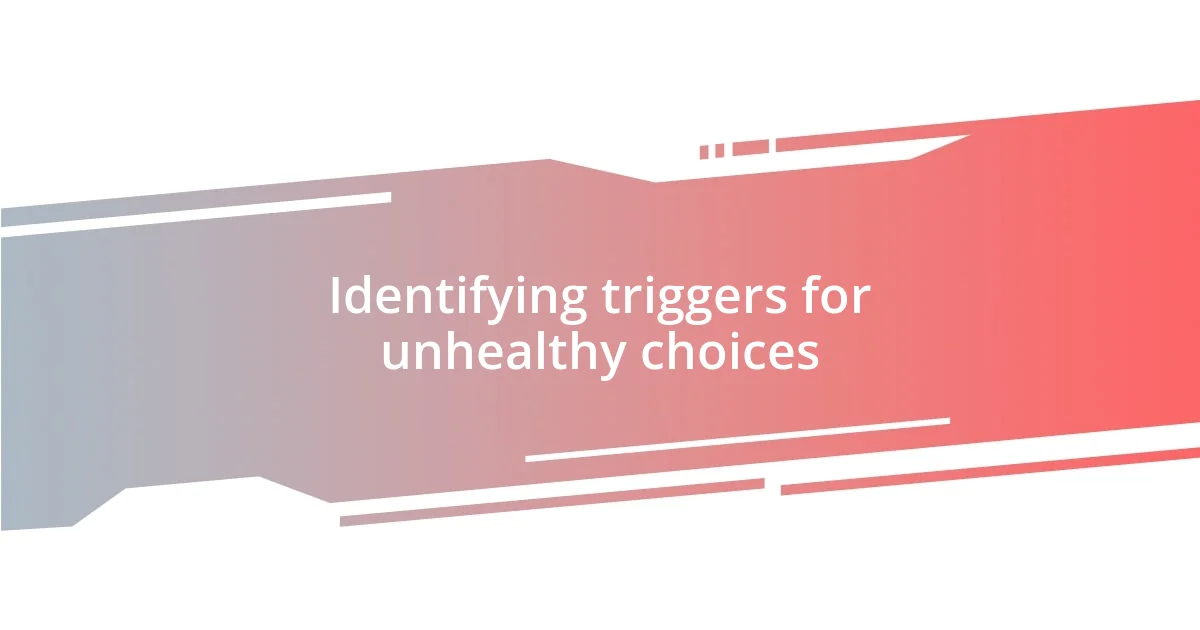
Identifying triggers for unhealthy choices
Recognizing what drives me toward unhealthy choices was a revelation. There were moments when I would unconsciously reach for a snack while binge-watching my favorite shows, not because I was hungry, but because it had become part of the routine. The allure of deliciously salty popcorn or crunchy chips became a habit tied to relaxation, blurring the line between hunger and habit. It struck me that my environment and routines significantly influenced my cravings.
Identifying triggers involves digging deeper into daily patterns. Here are some insights I’ve gathered:
- Emotional States: Stress and fatigue often pushed me to seek quick comfort in junk food.
- Social Settings: Parties or gatherings tended to trigger excessive munching, as I felt the need to conform.
- Routine Behaviors: Watching TV or scrolling through my phone made snacking feel like second nature, almost automatic.
- Visual Cues: Just seeing a commercial for a favorite treat could ignite cravings even if I wasn’t hungry.
- Accessibility: Having junk food readily available in my pantry made it too easy to indulge without a second thought.
Through these reflections, I became more mindful, focusing on the true reasons behind my snack choices. Each trigger was a clue, teaching me how to navigate my cravings with intention.
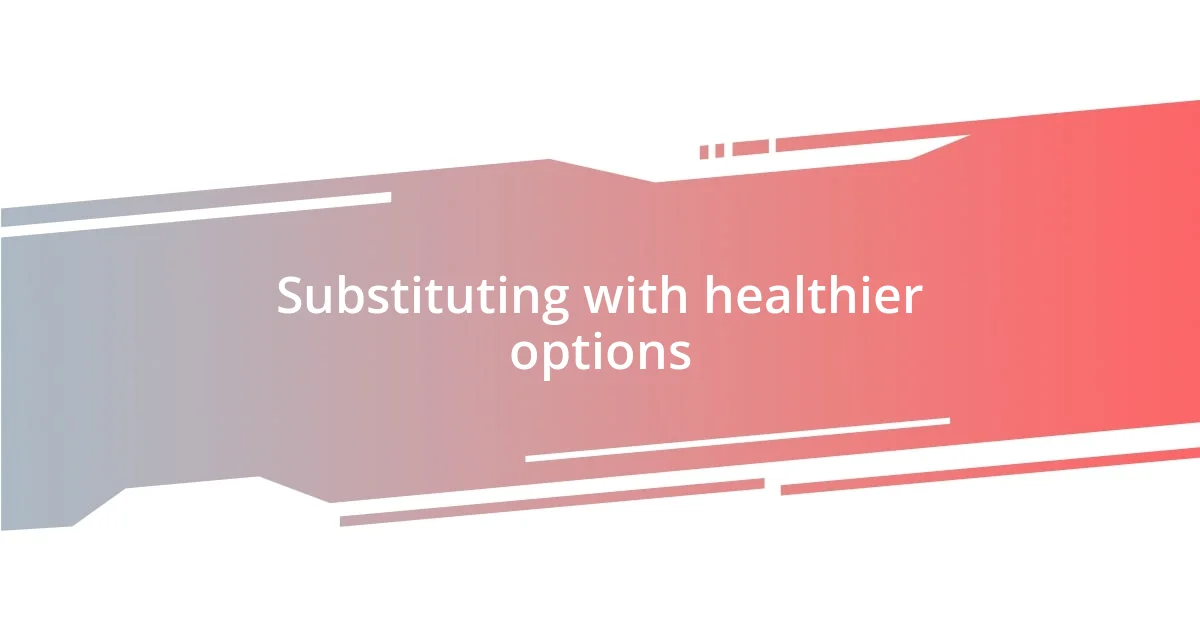
Substituting with healthier options
When I decided to kick my junk food habit, I quickly learned that simply cutting out my favorite treats wasn’t enough. Instead, I found joy in discovering healthier alternatives that satisfied my cravings without the guilt. For example, instead of reaching for chips while watching TV, I swapped them out for air-popped popcorn sprinkled with my favorite spices. This little change not only resolved my urge to crunch but also made my snacking feel much more rewarding. Isn’t it amazing how small substitutions can lead to significant changes in our eating habits?
As I continued this journey, I also found myself experimenting with fruit-based snacks. I remember one day, feeling a strong urge for something sweet, I looked for something better than chocolate bars. I blended up a delicious smoothie with frozen berries, yogurt, and a splash of honey. The result was not just delicious but also refreshing and guilt-free. Here, I realized how trading processed sugars for whole foods like fruits can immensely uplift both my mood and energy levels.
| Junk Food | Healthier Options |
|---|---|
| Chips | Air-popped popcorn with herbs |
| Chocolate bars | Fruit smoothies |
| Candy | Dark chocolate or fruit |
| Ice cream | Greek yogurt with honey or fruit |

Building a supportive environment
Creating a supportive environment was crucial for me as I kicked my junk food habit. I vividly remember clearing out my pantry—removing the last remnants of chips and cookies felt like shedding a weight I didn’t realize I was carrying. It became evident that if I wanted to change my eating habits, I needed to surround myself with healthier choices. So, I started stocking up on fresh fruits and nuts instead. I remember how satisfying it felt to see vibrant apples and bananas taking up the space where junk food used to linger.
Having a network of supportive friends and family also played a significant role in my journey. I shared my goals with those close to me, and their encouragement made a world of difference. When one of my friends invited me to a get-together featuring healthy snacks, I felt empowered rather than tempted by the usual fare. I sometimes wonder how many people overlook the power of community support. I believe that sharing my journey helped not only me but also inspired others to reflect on their own habits.
Finally, I didn’t just focus on what I was keeping out of my home but also on the activities I filled my time with. I made it a point to engage in hobbies that kept me active, like hiking and cooking healthy meals. By shifting my focus from food-centric activities to ones that were more fulfilling, I found myself naturally distancing from junk food. I still remember the thrill of discovering a new recipe for a hearty quinoa salad—it was a reminder that nutritious food can fuel not just my body, but also my passion for cooking. Doesn’t it feel rewarding to replace a habit that leaves you feeling guilty with one that makes you feel proud?
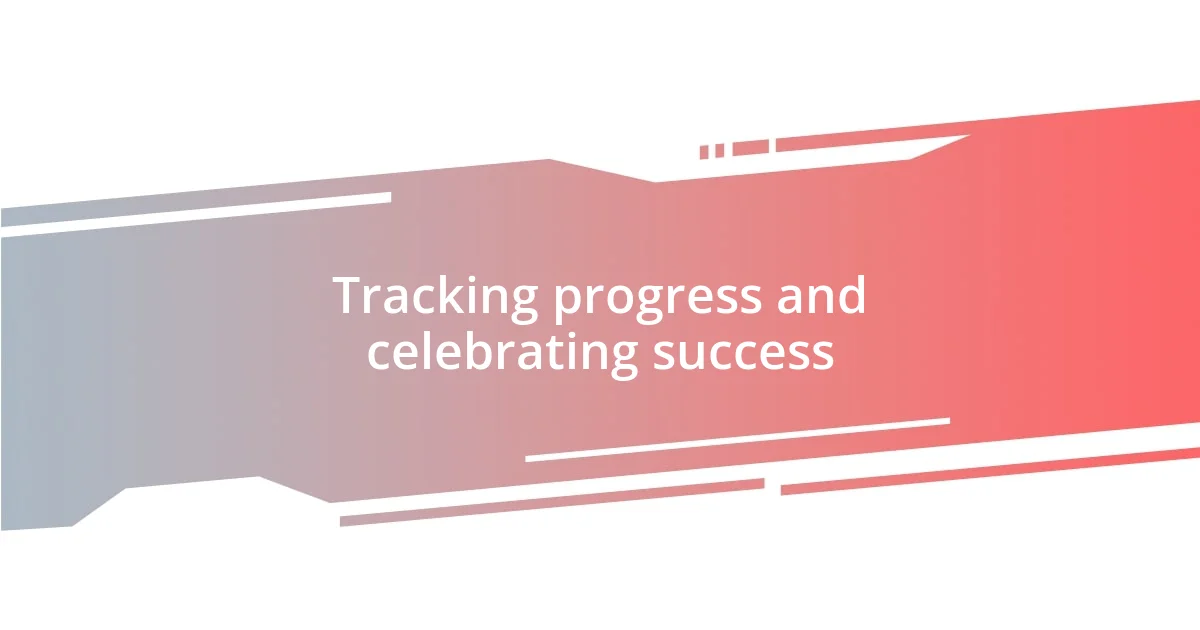
Tracking progress and celebrating success
Tracking my progress became a motivating factor in my journey. Early on, I began keeping a simple journal, noting down not just the days I resisted junk food but also how I felt on those days. I remember the rush of excitement when I realized I had gone an entire week without my usual cravings. It was a tangible reminder that I was moving forward, and it’s incredible how seeing those entries filled me with confidence and a sense of accomplishment. Have you ever tried tracking your progress in a similar way? It can truly be a game changer.
Celebrating the small victories is just as vital as recognizing the bigger milestones. I made it a point to treat myself differently; instead of rewarding myself with food, I opted for things that aligned with my goals. For instance, after a month of healthier eating, I treated myself to a new workout outfit that made me feel great. I still recall strutting into the gym wearing it, fueled not just by my fitness progress but also by the joy of having acknowledged my hard work. It’s amazing how swapping that reward could shift your entire perspective on success, right?
In those moments of celebration, I learned that it’s crucial to embrace the journey, and not just the destination. I often reflected on how far I had come, recalling the times I doubted whether I could truly change my habits. Each celebration, whether it was simply enjoying a serene dinner with friends or sharing my story with others, solidified my commitment to sustain my healthier lifestyle. At the end of the day, isn’t it fulfilling to recognize and share our progress?
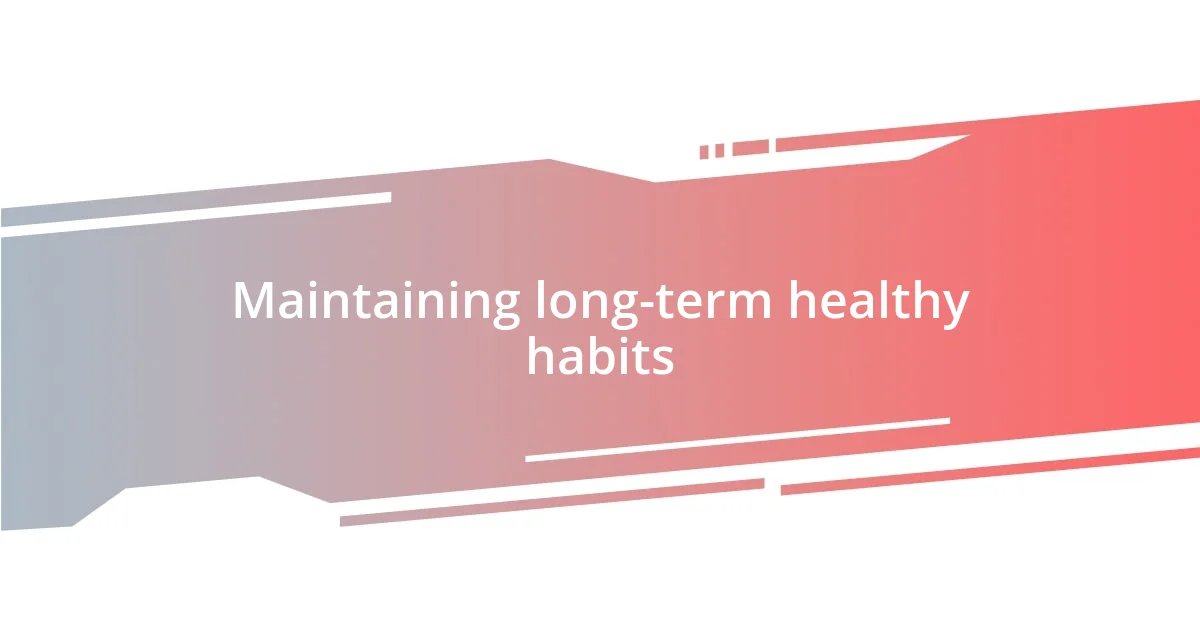
Maintaining long-term healthy habits
Maintaining long-term healthy habits is truly a journey shaped by mindfulness and consistency. One strategy that worked wonders for me was setting realistic goals. I vividly recall my first month—rather than aiming to overhaul my entire diet in one go, I focused on one meal at a time. By committing to healthy breakfasts, I found myself energized and motivated, which naturally led me to make better choices for lunch and dinner. Isn’t it interesting how a small change can snowball into larger transformations?
Another essential element has been keeping my meals interesting. I remember the first time I experimented with homemade veggie wraps; the satisfaction of crafting something colorful and filled with nutritious ingredients reignited my passion for cooking. When I reflect on those early days, I realize that the novelty kept me engaged and excited about my meals. It’s a stark contrast to the monotony that often comes with unhealthy snacking—what if we could bring creativity back to our plates?
Lastly, I’ve learned the vital importance of self-compassion during this journey. There were days when I stumbled; for instance, attending a party where junk food was front and center tested my resolve. Instead of berating myself, I allowed for grace and reminded myself that progress isn’t linear. Simply acknowledging those moments as part of the path helped me stay committed over the long haul. Have you considered how self-forgiveness could transform your experience? I believe that embracing our imperfections makes us more resilient in maintaining our healthy habits.






